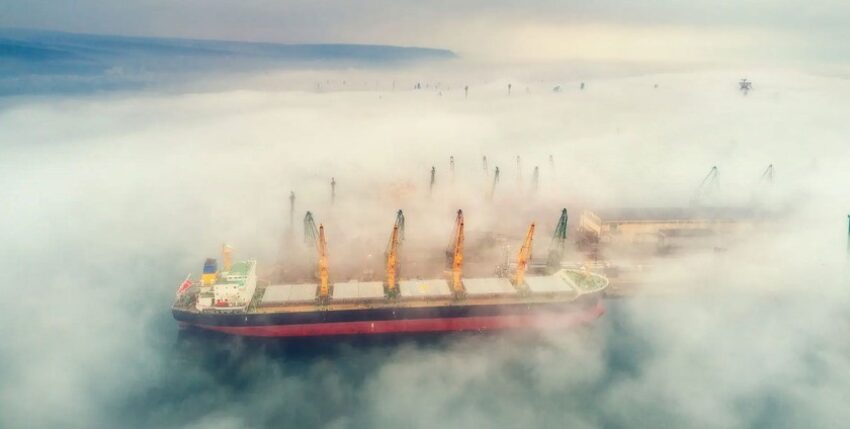Maritime trade with Russia and Ukraine - impacts on global logistics and ship-building markets - by Prof Dr Uwe Jenisch
Deliveries of oil. gas, coal, grain and raw materials from Russia by ship have largely been cancelled. Container, ferry and feeder traffic with Russian ports has thinned out. ports has been thinned out. New cargoes to and from Russia are being rejected. Russian ships are being turned away in many harbours around the world or subjected to increased checks for boycott goods.
Pipelines remain open for the time being. The Black and Azov Seas are a "war zone" under insurance law, bringing traffic to a standstill. GPS interference & AIS spoofing in the region. Over 100 merchant ships flying various flags are stuck in the region with around 1000 sailors. Efforts are being made to evacuate them. At least 5 merchant ships have been shot at (2 dead). Ukraine loses harbours and thus significant import and export opportunities.
At 24.1 million tonnes, Russia is a major customer for German ports, accounting for 9% of annual throughput. Germany is dependent on Russian imports. German dependence on Russian imports is not only for gas and oil but also for nickel, titanium, aluminium, copper and palladium, i.e. key metals for the "green economy"!!!
Russian navy at war
Effective Sea blockade Ukrainian harbours with Russian warships. warships.
Allegedly around 400 anchorMines older russ. The mines were laid off Odessa and on shipping lanes as far as the Bosporus (some of them floating), presumably by Russia. Turkey and Romania have neutralised individual mines.
At least four medium-sized Landing ships (Ropucha and Alligator class) approx. 4000 tonnes, 20 battle tanks each, 300 soldiers have not yet been deployed, 1 Alligator sunk.
Numerous Russian. cruise missiles for firing at land targets from ships. All Russian "stand-off weapons" remain dangerous.
Ukraine is very successful at sea and on land with Turkish (!) Combat drones. However, the Ukrainian air and missile defence is inadequate.
Supplies by sea for Russ. Occupation troops in eastern Ukraine is still possible because of Russian naval and air supremacy. Russian naval and air supremacy.
Illegal attacks on Uninvolved merchant ships, see above.
Russ. Reinforcements via Turkish Straits hardly possible, therefore hardly any naval reserves.
Russ. Armed Forces in Syria could face supply problems.
Russ. Merchant fleet withdraws from world trade
Cargo shares in the world market: tankers 5.2%, LNG 6%, coal 15%, total bulkers 3.7%, containers 3%
Ownership shares (owned & operated): Tanker 7.4%, LNG 3.5%, Bulker 0.8%
Proportion of superyachts: 7-10%, currently on the run worldwide as far as Vladivostok (Washington Post: "Schadenfreude at sea").
General: tendency to flee from Russ. Flag; boycott of the Russ. Register & Classification Society.
Around 200,000 Russ. seafarers (10.5% out of 1.9 million worldwide) work on 74,000 seagoing vessels (Ukraine 4% seafarers). These 15 % seafarers are affected as their pay, flights home and crew changes become non-performing. (Similar problems are expected for tens of thousands of lorry drivers in Europe). Merchant ships and yachts continue to sail partially camouflaged (AIS switched off).
Straits
Turkish straits are closed to warships (including NATO). Russ. Navy cannot be reinforced from outside (minor exceptions possible for Russ. Warships whose "home port" is in the Black Sea). Kerch Strait closed to maritime traffic. The Kiel Canal could possibly be closed, as it is not an international waterway, but the effect would be minimal. Danish straits remain free.
Shipbuilding, shipyards, marine technology
Current shipbuilding orders from Russian owners at shipyards in Europe and Asia (e.g. superyachts and LNG tankers) are being cancelled, as are current and future newbuilding orders for warships and merchant ships at Russian shipyards. shipyards. Added to this is the uncertainty about the further development of maritime trade and the need for transport space. Due to the extremely high freight rates, shipowners are nevertheless ordering newbuildings in Asia for containers, tankers and LNG!
Acceleration of the maritime arms race (which types of ships and weapons prove their worth?)
Offshore energy (wind, oil, gas) and raw material extraction (marine mining) have a future.
World trade and maritime transport
The extreme rise in freight rates and fuels (heavy fuel oil and diesel) as well as the already cost-intensive obligation to convert to clean ship propulsion systems make all goods more expensive with immediate effect. General insecurity and fear-mongering lead to a decline in global maritime trade, including cruises. No new business with Russia. Flight of people, capital, companies and ships from Russia.
Fundamental rethinking of trade with China, disruption of the Silk Road(s) and air freight routes to Asia.
The following applies to all countries: many supply chains are disrupted and require reorientation, particularly for energy supply and raw material security (new supply options?) The switch to "green economy" and the fight against climate change have been set back. Countries that are heavily dependent on the sea, such as China and Germany/EU, are particularly affected. China's stance remains diffuse, although the state (actually) has an interest in secure and undisturbed trade routes and secure customer relationships.
The impact on the Third World - e.g. the Middle East and Africa - is likely to be catastrophic if food/grain and energy become significantly more expensive (30% of world wheat trade, also sunflower oil (51%), barley (26%), maize (15%), rapeseed (12 %) go via the Black Sea). Impoverishment and migration are to be expected.
ALL economic effects will be felt for a long time.










